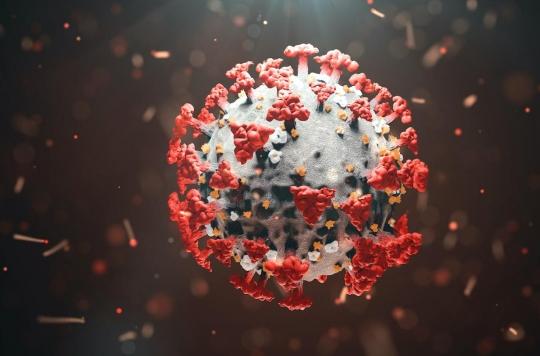Several medical professors are calling for permission to use immunotherapy to treat Covid-19. They estimate that this would make it possible to divide by three the risk of hospitalizations.

- In the United States, two antibodies have received exceptional authorization for use, which certain European countries are also in the process of issuing.
- Bamlanivimab, casirivimab and imdevimab showed a decrease in viral load.
- The twelve professors of medicine are calling for the timetable to be accelerated and for these treatments to be authorized.
All means are good against Covid-19. In this sense, twelve professors of medicine have published a column in the journal The world to demand the authorization of immunotherapy to treat Covid-19 in the oldest patients. “Currently, these patients do not have access to any specific treatment and are followed at home by their doctor, then hospitalized in the event of aggravation. New treatments blocking the entry of the virus into cells have just shown their ability to divide the risk of hospitalization by three in two randomized double-blind studies against placebo which included more than 1,000 patients“, they plead.
Effective antibodies
The treatments put forward by medical professors are based on passive immunotherapy. “As with other infections, such as tetanus or rabies, it consists of quickly providing the infected patient with antibodies that persist for about a few weeks, in order to cure the infection.they point out. Plasma infusion of convalescent and hyperimmunized patients against the SARS-CoV-2 virus is an example of passive immunotherapy.” Serotherapy, i.e. the transfusion of blood plasma from patients cured of Covid-19 to hospitalized patients in serious condition, has shown only limited effectiveness. “This treatment requires complex logistics, is not free of infectious risk, varies from one plasma to another in effectiveness, and is not suitable for large-scale treatment in the midst of a pandemic.”, continue the professors of medicine.
The professors of medicine insist on the drugs which stimulate the antibodies capable of blocking the entry of the virus into the cells: the lymphocytes. The targeted drugs are bamlanivimab, casirivimab and imdevimab. “For bamlanivimab, 309 patients received a single administration of this antibody at different doses, and 143 patients the placebothey recall. The infusion of this antibody was carried out in patients with symptoms of the disease, not requiring hospitalization, a maximum of three days after a positive test for SARS-CoV-2. The primary endpoint of the study – the decrease in viral load on day 11 – was achieved with one of three doses. Each of them reduced the risk of hospitalization with, in patients at risk of a severe form (approximately 70% of patients included in the study), a risk of hospitalization of 4% under bamlanivimab and of 15 % on placebo. No patient on bamlanivimab was hospitalized in intensive care. And the tolerance of the treatment was very satisfactory.” The results of the study were published on October 28 in the New England Journal of Medicine. For the other two drugs, the results have not yet been published but the United States Drug Administration (FDA) has indicated that the viral load fell more rapidly in patients who took the treatment.
Accelerate the schedule
These antibodies could be a complement to vaccines. “Elderly and frail patients are not necessarily those who will produce the most antibodies in response to vaccination, and these antibodies could remain valuable in the event of infections of subjects at high risk of severe form – residents of residential establishments for dependent elderly people, for example, or patients who have had an organ transplant”, they believe. In the United States, these two antibodies have received exceptional authorization for use, which certain European countries are also in the process of issuing.
Doctors now expect the French authorities concerned to position themselves and plead for authorization. “It is now to be hoped that the French authorities will be able to find a framework to allow, from the next few days, access to these antibodies for patients at risk of a severe form, while continuing to study their tolerance and their effectiveness, and the evaluation of the cost/benefit ratiothey insist. The health situation justifies an acceleration of the calendar.”
“In addition to ‘screening-tracing-‘, we finally have the possibility of treating the elderly and the most fragile patients to avoid their prolonged hospitalization and the risk of severe complications. Access to these treatments, some of which are made in France, would also reduce the risk of hospital saturation. Don’t miss this chance!”, they conclude.

.
















